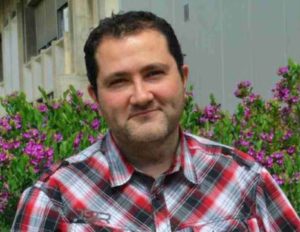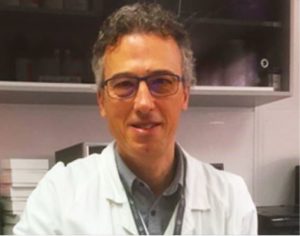Can you explain how you got into biomedical research?
And how did that lead to the launch of Deep Detection?
What made you choose to collaborate with The Collider?
How has The Collider helped to bridge the gap between science and industry?
How did The Collider help to turn your research’s practical applications into reality?
What opportunities did you gain from being part of The Collider?
Would you collaborate with The Collider again?
Can you tell us a bit about the work you do and how you got started?
Is there a gap between scientists and industry in your field and why?
How did The Collider help to turn your science into a reality?
Why is Barcelona a good place to be based for these tech-transfer initiatives?
How was your work with The Collider received within the scientific community in Barcelona?
Would you collaborate with The Collider again?
The Collider aims to bridge the gap between science and corporations, encouraging tech-transfer initiatives like those of scientists José Gabriel Macías Montero, Co-Founder of Deep Detection, and José Manuel Soria, Co-founder of Exheus. We spoke to them about their experience as scientists at The Collider and how the programme helped them to launch their two successful businesses.
 José Gabriel Macías Montero’s company, Deep Detection, develops multispectral x-ray cameras for food and beverage inspection.
José Gabriel Macías Montero’s company, Deep Detection, develops multispectral x-ray cameras for food and beverage inspection.
Can you explain how you got into biomedical research?
I started off designing microwave circuits for mobiles and satellites before taking an opportunity to work at the High Energy Physics Institute in Barcelona, developing a chip for PET brain scanners.
And how did that lead to the launch of Deep Detection?
Both projects were to do with high-energy particle detection. But, with Deep Detection, we use X-ray detection to discriminate between certain food or drink materials, allowing manufacturers to evaluate how much salt there is in ham – for example – or if there are any contaminants in a drink, or even how ripe fruit is. This allows us to access a lot more information about raw materials, which could revolutionise the food and drinks industry.
What made you choose to collaborate with The Collider?
We knew that our technology had huge potential and we wanted to do something with it. I hadn’t heard about the programme before but when I was told about it, I knew it was the missing link and a great opportunity for us.
How has The Collider helped to bridge the gap between science and industry?
It’s so difficult to turn science and research into something you can market. There’s less of a gap with digital technologies, but for hardware and other systems, there’s no road to follow or examples to learn from. Finding investment can be challenging, no matter how good your idea is. You might know for a fact that the market needs you, but how do you get there?
This is where a programme like The Collider comes in, which can offer access to commercial expertise, helping you to develop business operations and get your feet on the ground. They say, ‘Your idea is great. Let’s see how the market likes it too.’
How did The Collider help to turn your research’s practical applications into reality?
The Collider helped us to connect with the market. From day one, they found the project very interesting and the feedback was very positive. In fact, in the first weeks, they contacted sixty different companies and half of those gave an immediate response.
The Collider also taught us to focus on end-users – those companies that might be able to use our inspection machines. We were able to learn about these end-users and how we could target them and bring our technology to market.
What opportunities did you gain from being part of The Collider?
The Collider provides a means to expand your network, allowing you to meet other people and see other projects. You work in a very close environment with other start-ups. This creates a fertile ecosystem for communication and idea generation.
Would you collaborate with The Collider again?
I would recommend it 100% when it comes to bringing science or technology to market. The business professionals at The Collider are very knowledgeable. They are able to say, ‘this bit of your project is good but we need to work on this bit…’
José Manuel Soria’s platform Exheus provides gene expression analysis and AI for better performance and health.
Can you tell us a bit about the work you do and how you got started?
We started off by investigating the genome of runners. We wanted to see if running a certain distance was healthy or not based on the expression of the genome just before and just after the race.
The research showed that this was a very powerful approach to evaluating health. Today, we are applying this understanding to the general population. It’s a remarkable change in our health paradigm. Usually, we study diseases and ill people. With this approach, we study health and healthy people. Why are some people healthy? What are the biological conditions that keep us healthy?
Is there a gap between scientists and industry in your field and why?
There is definitely a gap, especially in the field of personalised medicine. Everyone’s talking about it but not many people understand what it is. This is because scientists and business people don’t speak the same language.
But The Collider is helping to bridge this gap. Teresa, Exheus Chief Executive Officer and Collider Co-Founder, is a great example. She’s a scientist that has made the jump into business. That means we speak the same language.
How did The Collider help to turn your science into a reality?
The Collider helped us to make the transition to the market, giving us access to a network of professionals. We were able to meet other teams and learn how to build a successful company. This network is one of the programme’s strongest advantages.
Why is Barcelona a good place to be based for these tech-transfer initiatives?
Barcelona is one of the most important hubs for health companies in Southern Europe. We have some of the most cutting-edge hospitals, health-related companies, and pharmaceutical enterprises. And, of course, good weather!
How was your work with The Collider received within the scientific community in Barcelona?
We had a very good reception from investors. People understand that we need to make personalised medicine a reality today. Last year, we even received an award for our innovative work.
Would you collaborate with The Collider again?
We participated twice with The Collider on two consecutive programmes and we were able to improve the relationship. The Collider did a great job on taking our feedback on board and, the second time we took part, they had changed and adapted the programme to better suit our needs.
It’s a great programme for a scientist to get business training and learn to speak the language of business. The programme is bringing together the two distinct worlds of science and industry, and has proven capacity to keep improving, adapting, and changing.

